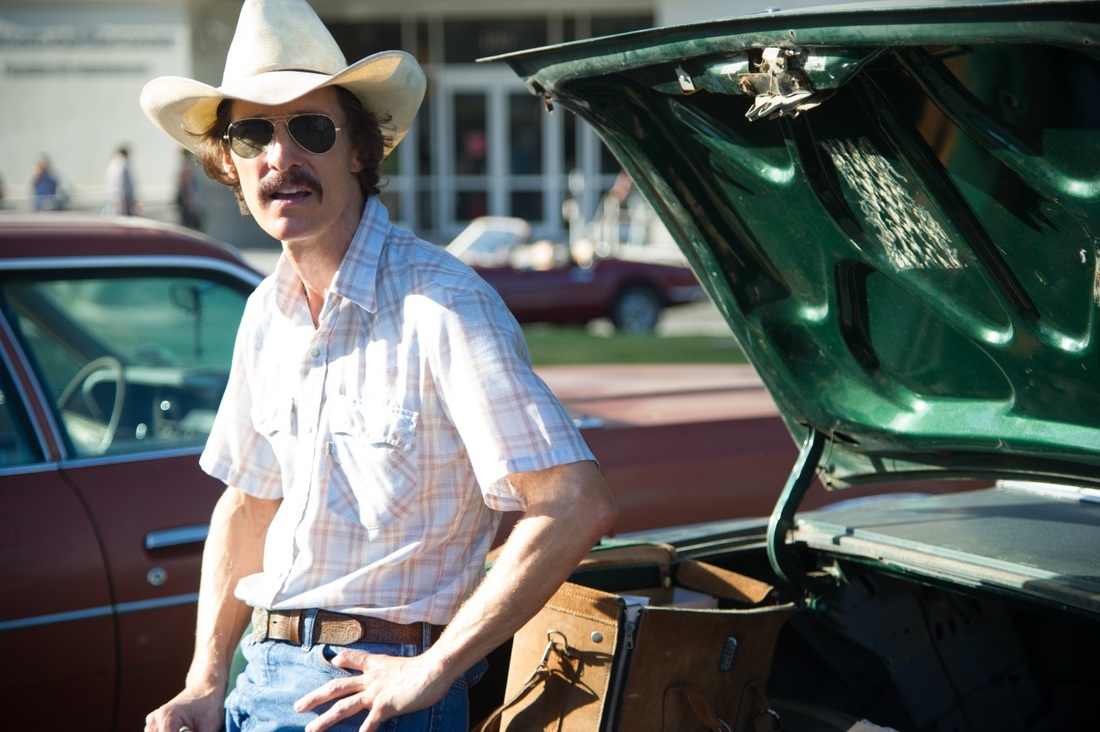When an actor’s filmography boasts such horrors as Ghosts of Girlfriends Past and Sahara--a movie so atrocious that I documented my anguished mental commentary on three full pages of a legal pad to avoid the otherwise-certain accidental groan of withheld misery, which would’ve tarnished an otherwise pleasant night of family movie-watching — you might understandably hold low performance expectations for said actor’s future films. But Matthew McConaughey’s stellar recent performances in films like Bernie and Mud turned the tide, giving substance to his typical good ol’ boy persona and setting the stage for him to take on more challenging and complex roles.
Enter Dallas Buyers Club, which features a powerhouse performance from the stand-alone star as an unlikely hero of the alternative medicine movement in the 1980s. McConaughey famously shed 40 pounds to portray his AIDS-affected character, but his physical transformation—while astonishing—is not responsible for his ultimate triumph. McConaughey shows amazing restraint and control while fury builds in his eyes and occasionally settles in his fists. A constant undercurrent of tension and frustration, expertly managed by the screenplay, does not drown out character actions and other motivations. McConaughey’s performance, featuring spontaneity, passion, and fury, may be the best of his career.
The year is 1985, and the AIDS virus is in full swing. Rob Woodruff (Matthew McConaughey) is a whisky-drinking, bull-riding, sex fiend electrician who spends his free time gambling and high on cocaine when a workplace accident lands him in the hospital. Already skeletal and featuring a lung-wrenching cough, doctors inform him that he has contracted the AIDS virus and they estimate he only has 30 days left to live. After initially cursing at the doctor for supposedly accusing him of being gay, Woodruff bursts from the examination room saying, “Fuck this. There ain’t nuthin’ out there that can kill Ron Woodroof in 30 days.” This is perhaps the cornerstone of McConaughey’s performance—as he plays into the immediacy of his situations, he keeps the film from stumbling into typical Hollywood uplift and instead brings a sense
As his friends and neighbors abandon him—believing he could’ve only garnered this diagnosis through homosexual relations—and his doctors prescribe only support groups, he seeks alternative ways to access life-saving drugs. In an era when 94% of those diagnosed with HIV died within 6 months, he knew his chances of living with the disease were slim, so he makes a deal with a janitor at Dallas Mercy Hospital to provide him with AZT from the hospital’s clinical trial. After the hospital cracks down on the stolen AZT, Woodruff begins making regular round-trips to Mexico to access vitamins, herbs, and medications unapproved by the FDA. He and his unlikely transsexual business partner, Rayon (Jared Leto), both use the drugs they procure and sell them to other desperate AIDS victims who become members of his “buyers club.” He is soon traversing the globe to obtain the best AIDS medications available while continuing his crusade to bypass and degrade the US medical establishment, by whose rules and regulations he would’ve died years before.
Dallas Buyers Club never allows the audience to forget that it’s set during a staggeringly tragic epidemic, but it also doesn’t allow traumatic context to overshadow Woodruff’s daring and heroic journey. Dallas Buyers Club lets McConaughey shine as the fact-based film beautifully portrays both the challenging life-and-death circumstances motivating AIDS-affected characters and the misguided medical system that treated them as lab animals and signed their death certificates before they’d stopped breathing.
Grade: A

 RSS Feed
RSS Feed
